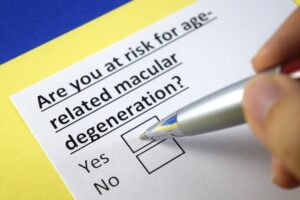What is Macular Degeneration?
 One of the leading causes of vision loss in the United States is age-related macular degeneration (AMD). The progressive condition involves the breakdown of the macula, or the portion of the retina that we need for clear central vision.
One of the leading causes of vision loss in the United States is age-related macular degeneration (AMD). The progressive condition involves the breakdown of the macula, or the portion of the retina that we need for clear central vision.
The two forms of macular degeneration are the “dry” early stage and the “wet” advanced stage. Approximately 90 percent of AMD cases classify as dry.
Macular Degeneration Symptoms
If you have the wet form of macular degeneration, you may have one or more of the following treatments:
- Blurry or reduced central vision
- Blank spots that appear near the center of the visual field
- Colors that appear more faded than usual
- Straight lines that appear wavy
- Difficulty reading in low light
- Difficulty recognizing faces
AMD Risk Factors
Age is the biggest risk factor for AMD. The disease is most likely to affect people over the age of 60.
Other risk factors include:
- Family history of AMD
- Smoking
- Obesity
- Race – AMD is most common in Caucasians
Macular Degeneration Prevention Tips
Making healthy lifestyle choices may reduce the risk of getting AMD, or slow down its progression. Our doctors recommend the following:
- Do not smoke
- Eat a healthy diet including plenty of vegetables and fruits
- Keep blood pressure and cholesterol levels within a normal range
- Manage existing medical conditions (e.g., diabetes)
- Exercise regularly
- Protect eyes from the sun
 If you do notice early signs of AMD, contact a doctor promptly for evaluation. Early diagnosis and treatment can help you reduce your risk of progressing from dry to wet AMD or losing vision to the disease.
If you do notice early signs of AMD, contact a doctor promptly for evaluation. Early diagnosis and treatment can help you reduce your risk of progressing from dry to wet AMD or losing vision to the disease.
AMD Diagnosis
AMD is diagnosed with a comprehensive eye exam. After the eyes have been dilated, the doctor checks the eyes for signs of AMD. With dry AMD, deposits called drusen appear under the retina. With wet AMD, irregular blood vessels form under the retina and leak blood and other fluids.
Other tests may be performed to confirm or rule out AMD. For instance, an Amsler grid may be used to look for defects in central vision; if you have AMD, the straight lines of the grid may appear wavy or distorted. Fluorescein angiography or optical coherence tomography testing may also reveal changes to the retina that suggest AMD.
Macular Degeneration Treatment
AMD cannot be cured, but with the right medical care, it can be managed. Treatment for AMD depends on the form of the disease.
Studies suggest that nutritional supplements can be useful to slow or stop dry AMD from progressing to wet AMD. Age-Related Eye Disease Study (AREDS2) supplements are specifically formulated with a combination of vitamins and minerals, including vitamins C/E, lutein and zeaxanthin, that support macular health.
If irregular blood vessels have started to grow and leak underneath the retina, other therapies like injections or laser treatment may be recommended. Medication can be injected directly into the eye to slow down leakage and inhibit the development of new blood vessels. In some cases, laser therapy can seal off leaking blood vessels.
Our fellowship-trained retinal specialist, Dr. Guri Bronner, and the rest of our team of doctors will recommend the treatment plan that is most likely to stop or slow the progression of your AMD.
Learn More about Age-related Macular Degeneration
For more information about the symptoms, diagnosis or treatment of AMD, please contact the team at Berks Eye Physicians & Surgeons. Call or email us today.
 1802 Paper Mill Road, Wyomissing, PA 19610
1802 Paper Mill Road, Wyomissing, PA 19610

